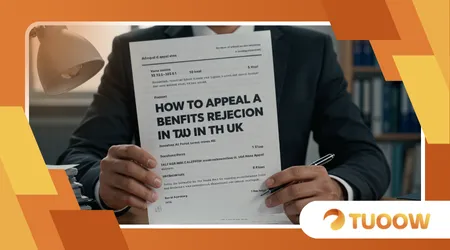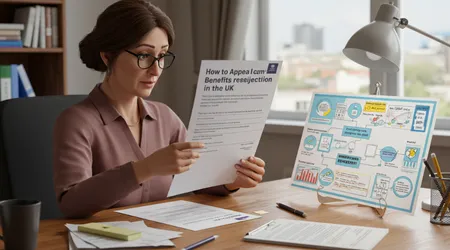How to Appeal a Benefits Rejection in the UK

To appeal a benefits rejection can feel like navigating a maze blindfolded, but with the right steps, clarity emerges.
In the UK, thousands face benefits decisions that don’t reflect their circumstances decisions that can disrupt lives.
Whether it’s Universal Credit, Personal Independence Payment (PIP), or Employment and Support Allowance (ESA), a rejection doesn’t have to be the final word.
This guide unpacks the appeals process with practical advice, real-world examples, and a human touch to help you reclaim what’s rightfully yours.
By understanding the system, gathering evidence, and staying resilient, you can turn a “no” into a fair outcome. Let’s dive into the process, explore why rejections happen, and empower you to take control with confidence.
The UK’s benefits system, managed by the Department for Work and Pensions (DWP), is complex and often impersonal.
Each year, millions apply for support, yet many face denials due to strict eligibility criteria or administrative errors.
In 2023, Citizens Advice reported that 60% of PIP appeals succeeded at tribunal, highlighting how often initial decisions miss the mark.
This statistic isn’t just a number it’s a lifeline for those who feel unheard. Appealing isn’t just about challenging a decision; it’s about asserting your right to be seen and understood.
With deadlines looming and forms piling up, the process can seem daunting, but breaking it down makes it manageable. Let’s start by exploring why rejections occur and how you can prepare to fight back.
Why Benefits Get Rejected
Understanding why your claim was denied is the first step to appeal a benefits rejection. Often, it’s not personal but procedural forms misfilled, evidence overlooked, or criteria misunderstood.
The DWP processes millions of claims annually, and human error creeps in. For example, Jane, a 45-year-old from Leeds, had her PIP claim rejected because her form didn’t fully detail her mobility issues.
A quick glance at the decision letter can reveal gaps like these.
Sometimes, rejections stem from rigid eligibility rules. Universal Credit might deny you if income calculations are off, even slightly.
++ UK Disability Rights: What Support Can You Get?
Medical assessments for ESA or PIP can also misjudge your condition’s impact. These decisions aren’t always fair, but they’re not final either. Knowing the “why” helps you build a stronger case.
Another common issue is insufficient evidence. The DWP relies heavily on what you submit forms, medical records, or letters. If these don’t paint a clear picture, rejection follows.
Imagine a painter leaving half the canvas blank; the viewer can’t see the full story. Similarly, your claim needs detail to shine through the DWP’s scrutiny.

Step 1: Request a Mandatory Reconsideration
Before you can appeal a benefits rejection, you must ask the DWP to review their decision this is called Mandatory Reconsideration (MR).
You have one month from the decision letter’s date to act. Contact the DWP by phone, letter, or online, clearly stating you disagree and why. For Universal Credit, use your online journal.
Be specific but concise. Highlight errors, like if the decision ignored your doctor’s report. John, a Manchester resident, succeeded at MR by submitting a new GP letter clarifying his condition.
Also read: Maternity and Paternity Leave Benefits in the UK
Don’t just repeat your original claim add fresh insight to strengthen your case.
Missing the deadline can complicate things, but late requests are sometimes accepted with good reason, like illness. Always keep copies of what you send.
This step is your first chance to correct misunderstandings before escalating further.
The MR process can take weeks, so patience is key. The DWP will send a Mandatory Reconsideration Notice with their final decision.
If they uphold the rejection, don’t lose hope you’re now clear to appeal to a tribunal.
Step 2: Lodging Your Appeal
If the MR fails, it’s time to appeal a benefits rejection at an independent tribunal. You have one month from the MR Notice to submit Form SSCS1, available on GOV.UK.
Fill it out carefully, attaching the MR Notice and any new evidence. Send it to HM Courts and Tribunals Service (HMCTS).
Choose whether you want a hearing (in-person, video, or phone) or a paper-based decision. Hearings are better for explaining your case personally.
For example, Sarah, a Bristol mother, won her PIP appeal by describing her daily struggles face-to-face. Tribunals are impartial, unlike the DWP.
Read more: How to Claim Jobseeker’s Allowance in the UK in 2025
Late appeals need a valid excuse, like a hospital stay. The tribunal process feels formal, but it’s designed to listen. Think of it as a referee stepping in to ensure fair play after a bad call.
Tribunals can take months to schedule, so track your submission. You’ll get a letter confirming receipt and next steps. Stay organized this is your chance to set the record straight.
Gathering Strong Evidence
Evidence is the backbone when you appeal a benefits rejection. It’s not enough to say you’re struggling; you must prove it.
Start with medical records GP letters, consultant reports, or test results. These carry weight. Jane, from our earlier example, won her appeal with a detailed occupational therapist’s note.
Non-medical evidence counts too. A diary of your daily challenges, like difficulty dressing or working, adds depth.
Ask family or carers for supporting letters they know your reality. Ensure every piece is relevant and dated to avoid confusion.
Don’t overwhelm the tribunal with irrelevant documents. Quality trumps quantity. A single, clear letter from your doctor can outweigh ten vague ones. Organize evidence chronologically to tell a coherent story.
If gathering evidence feels tricky, seek help from Citizens Advice or local welfare rights groups. They can guide you to focus on what matters most.
Keep originals and send copies to the tribunal. This protects you if documents get lost. Strong evidence turns your appeal from a plea into a case.
Preparing for the Tribunal Hearing
Facing a tribunal to appeal a benefits rejection can feel nerve-wracking, but preparation eases the stress. You’ll face a judge and sometimes experts, like a doctor.
They’re independent, not DWP staff, and want to understand your situation. Arrive ready to explain how your condition affects you.
Practice describing your worst days what can’t you do?
Be honest, not dramatic. Sarah, our Bristol example, rehearsed with a friend, which boosted her confidence. Bring a supporter if it helps; they can’t speak for you but can offer moral backup.
The tribunal might ask tough questions. Stay calm and stick to facts. If mobility is the issue, explain specific limitations, like climbing stairs. Clarity wins over emotion.
Check all documents beforehand. Missing papers can delay things. If you’re attending remotely, test your tech poor connections frustrate everyone.
Tribunals aim for fairness, not intimidation. Picture them as a conversation, not a courtroom drama. Your voice matters here use it confidently.
What Happens After the Appeal
Once you appeal a benefits rejection and the tribunal decides, outcomes vary. If you win, the DWP adjusts your benefits, often backdating payments.
Jane received £3,000 in backdated PIP after her success. You’ll get a decision letter detailing the award.
If you lose, don’t despair. You can appeal to the Upper Tribunal, but only if the tribunal made a legal error, not just because you disagree.
This step is complex get advice from welfare experts before proceeding.
The decision letter explains why you won or lost. Read it carefully; it might guide future claims. Even a loss clarifies what evidence matters next time.
Winning feels validating, but delays in DWP processing can frustrate. Follow up politely to ensure payments start promptly.
A tribunal’s ruling isn’t just about money it’s about dignity. Whatever the outcome, you’ve stood up for your rights, and that’s no small feat.
Seeking Support and Advice
Navigating how to appeal a benefits rejection is tough alone, so don’t go it solo. Citizens Advice offers free, expert guidance call or visit their local branches.
Welfare rights groups, like those at Law Centres, also provide tailored support.
Online forums, like Benefits and Work, share tips from others who’ve appealed. But verify advice misinformation spreads fast. Stick to trusted sources like GOV.UK for forms and deadlines.
Charities tied to your condition, like Mind for mental health, often have appeal toolkits. Their insight can pinpoint evidence the DWP might’ve missed.
A friend or family member can help with paperwork or morale. John leaned on his sister to organize his ESA appeal, easing the stress.
Support isn’t just practical it’s emotional. Feeling heard by someone, professional or personal, keeps you grounded through the process.
Staying Resilient Through the Process

The journey to appeal a benefits rejection tests your patience delays, jargon, and setbacks pile up fast. But resilience matters more than perfection.
Set small goals, like gathering one piece of evidence daily, to stay focused.
Rejections sting, but they don’t define you. Sarah kept a journal to vent frustrations, which doubled as evidence for her PIP appeal. Find what keeps you steady.
Deadlines loom, so use reminders phone alerts or sticky notes work. Missing one can derail your case, and nobody wants that hassle.
Talk to others who’ve appealed. Their stories remind you you’re not alone. Online groups or local charities can connect you to these voices.
Why let a faceless letter dictate your future? Every step you take forms, evidence, hearings builds your case and your strength. Keep going.
Understanding Your Rights
Knowing your rights is crucial when you appeal a benefits rejection. The law entitles you to challenge DWP decisions that feel unfair.
The Social Security Act 1998 ensures access to independent tribunals, leveling the playing field.
You’re also owed clear reasons for rejections. If the DWP’s letter is vague, request clarification they must comply. This transparency helps you fight back effectively.
Legal aid exists for Upper Tribunal appeals, though it’s rare at earlier stages. Check GOV.UK for eligibility don’t assume you can’t afford help.
Your right to dignity underpins this process. Tribunals aren’t just bureaucratic; they’re a chance to be heard as a person, not a case number.
Exercising these rights takes effort, but it’s empowering. Each form you file, each letter you write, asserts your place in the system.
| Stage | Action | Time Limit | Key Tip |
|---|---|---|---|
| Mandatory Reconsideration | Request DWP review | 1 month from decision | Add new evidence to strengthen case |
| Tribunal Appeal | Submit Form SSCS1 to HMCTS | 1 month from MR Notice | Opt for a hearing to explain in person |
| Upper Tribunal | Appeal legal errors only | 1 month from tribunal | Seek expert advice before proceeding |
Conclusion
To appeal a benefits rejection is to reclaim your voice in a system that can feel cold and unyielding. It’s not just about money it’s about fairness, dignity, and being heard.
From Mandatory Reconsideration to tribunal hearings, each step demands patience, evidence, and grit. Jane and Sarah’s stories show that persistence pays off, whether it’s a backdated payment or a renewed sense of agency.
The process isn’t perfect delays and jargon test even the strongest but it’s navigable with the right tools and support. Citizens Advice, clear evidence, and a steady mindset are your allies.
You’re not just challenging a letter; you’re shaping your future. So, take that first step, gather your proof, and don’t let a rejection define you.
What’s stopping you from fighting for what’s yours?
Frequently Asked Questions
1. How long does it take to appeal a benefits rejection?
The process varies. Mandatory Reconsideration takes 2-8 weeks; tribunals can take 3-6 months, depending on HMCTS backlogs and hearing type.
2. Can I appeal without a lawyer?
Yes, most people do. Tribunals are designed for self-representation, but Citizens Advice or welfare groups can guide you.
3. What if I miss the appeal deadline?
Late appeals may be accepted with a valid reason, like illness. Explain clearly in your submission to HMCTS.
4. Will appealing affect my current benefits?
No, appealing won’t stop existing payments, but new claims might be paused until the tribunal decides.
5. Can I get help with tribunal costs?
Tribunals are free, but legal aid for Upper Tribunal appeals is available if eligible check GOV.UK for details.
